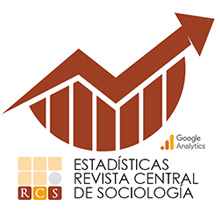Memory and utopian function as interpretation keys in social studies
Keywords:
Memory, utopia, social timeAbstract
The construction of social time is a ground of sociological research, however this aspect is generally overlooked or ignored as if it were a fixed frame established a priori, as if it did not constitute, by itself, an essential issue in social processes. I try to show that it is not only a constitutive element in the configuration of the symbolic and cultural order of societies; but it is also an essential aspect that also impacts the material reproduction of social life. Even more, it is a matter of a disputed terrain, insofar the ways of remembering and building collective memory and also the way of anticipating future projects and build utopias, both of them produce discourses and praxis that either maintain and reproduce the status quo, or they resist, transform or break it. Thus, I propose to explore the epistemic and heuristic richness of the categories “collective memory” and “utopian function” to interpret and explain the meaning of collective action and social change.
Downloads
Metrics
References
Baczko, B. (1999) Los imaginarios sociales. Memorias y esperanzas colectivas. Buenos Aires, Nueva Visión.
Bloch, E. (2004) El principio esperanza. Tomo I. Madrid, Trotta.
Bloch, E. (2006) El principio esperanza. Tomo II. Madrid, Trotta.
Bloch, E. (2019) Herencia de esta época. Madrid, Tecnos.
Butler, J. (2001) Mecanismos psíquicos del poder. Teorías de la sujeción. Madrid, Cátedra.
Cabado, J. M. (2007) “Ernst Bloch y las ciencias humanas”, en Revista Herramienta, número 35. Herramienta, Buenos Aires. En internet: http://www.herramienta.com.ar/revista-herramienta-n-35/ernst-bloch-y-el-sueno-de-las-ciencias-humanas
Dufour, D. R. (2007) El arte de reducir cabezas. Buenos Aires, Paidós.
Eagleton, T. (2008). Terror santo. México, Debate.
Echeverría, B. (2001). Definición de la cultura. México, Ítaca / UNAM.
Elias, N. (2010) Sobre el tiempo. México, Fondo de Cultura Económica.
Jameson, F. (1999) El giro cultural. Escritos seleccionados sobre el posmodernismo. Buenos Aires, Manantial.
Kosik, K. (2012) Reflexiones antediluvianas. México, Ítaca.
Harvey, D. (2008) La condición de la posmodernidad. Buenos Aires, Amorrortu.
Heinz, H. (2007) “Ernst Bloch: Entremundos y umbral de época”, en Vedda, Miguel. Ernst Bloch. Tendencias y latencias de un pensamiento. Buenos Aires, Herramienta, pp. 23-45.
Montesperelli, P. (2004). Sociología de la memoria. Buenos Aires, Nueva Visión.
Moore, B. (1989) La injusticia: Bases sociales de la obediencia y la rebelión. México, Instituto de Investigaciones Sociales, UNAM.
Ricoeur, P. (2008) La memoria, la historia, el olvido. México, Fondo de Cultura Económica.
Salmerón Infante, M. (2009) “Antes, desde y para el exilio. Herencia de esta época (1935/1962) de Ernst Bloch.” En ARBOR. Ciencia, pensamiento y cultura. Número 739. Madrid, CSIC. En internet: http://arbor.revistas.csic.es/index.php/arbor/article/view/357/358
Serra, F. (1998) Historia, política y derecho en Ernst Boch. Trotta.
Todorov, T. (2013) Los abusos de la memoria. Barcelona, Paidós.
Yurikko Medina, Violeta. (2007) “El dulce olvido. Memoria colectiva e imaginarios sociales. En VERSIÓN, num 19, México, UAM Xochimilco, pp. 265-283.
Published
How to Cite
Issue
Section
License
Copyright (c) 2020 Araceli Mondragón González

This work is licensed under a Creative Commons Attribution 4.0 International License.

















